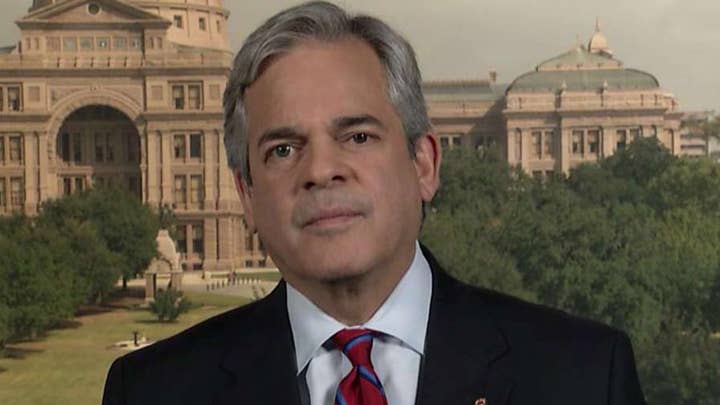Texas cleans up Austin homeless camps
Gov. Greg Abbott and Mayor Steve Adler have sparred over how to deal with the city’s homelessness issue. Now, the state is stepping in.
A homeless community in East Austin, Texas, has turned from a controversial state-sanctioned campsite into an organized 100-member town, complete with its own version of a city council.
So far, seven members have been chosen by residents for leadership positions that cover everything from bringing in donations to putting together community events.
AS TEXAS CLEANS UP HOMELESS ENCAMPMENTS IN AUSTIN, LONG-TERM SOLUTION IS UNCLEAR
"It's called 'Camp R.A.T.T', Responsible Adult Transition Town, for the homeless, run by the homeless," Cori Roberts, the secretary of a committee, told Fox7. "We give everybody a chance. We don't judge your past history or anything like that."
Roberts said there is a town meeting every week and everyone is invited to participate.
"It's called 'Camp R.A.T.T.', Responsible Adult Transition Town, for the homeless, run by the homeless."
"We have donation and volunteer recruiters, we have maintenance and general labor recruiters, we have the web designer, and the media outreach, we have security, and then we have the treasurer-donation organizer," he said.
LaShawn Ramsey, the web designer for the community, said the new pro-active structure is "important because we actually have a voice, we actually have a hand that we are actually putting forth to make our lives a little bit better."
Ramsey and Roberts believe it's vital to change people's perceptions of the homeless.
"We wanted to show people that we're not just criminals, drug addicts, slobs, bums of the street. ... That we're actually just like anybody else in this community, just without a house," Roberts said.
While that may be, the location of the camp and how it came to be has raised a few eyebrows.
Last year, Texas' Republican governor, Gregg Abbott, announced he would be creating a homeless campsite on 5 acres of state land in Austin -- a move that escalated a bitter battle between him and Austin's liberal leaders over homeless people living on the streets.
On Oct. 2, Abbott wrote: "Today I sent a letter to @MayorAdler about the growing crisis arising from the Austin Homeless policy. Feces & used needles are piling up & residents are endangered. If it's not fixed by Nov. 1, I'll use State authority to protect Texans' health & safety."
His plan to convert the property on the outskirts of downtown Austin caught the attention of national advocates for homeless, who couldn't recall another state ever making such a move.
Abbott's announcement was met with a mix of muted welcome and accusations of political posturing from Democrats who run the state capital. Abbott, who lives in the Texas Governor's Mansion in the city, spent months taking shots at how the city is responding to its growing homeless problem.
In 2019, Abbott suggested that crimes in Austin were the result of the city's approach to homelessness. Austin officials pushed back, noting that neither of the two crimes Abbott referenced was committed by a homeless person and that one of the crimes took place before a new Austin policy to relax ordinances prohibiting camping on streets took effect.
The war of words escalated again this month following the fatal stabbing of a restaurant worker by a homeless man.
Abbott said the attack magnified a "sense of lawlessness" in the liberal city. He once more tried to draw a link from relaxed ordinances to crime.
CLICK HERE FOR THE FOX NEWS APP
Austin Mayor Steve Adler has gone toe-to-toe with Abbott and accused the governor of incorrectly characterizing homeless people as criminals.
"His suggestion that people experiencing homelessness are criminals is not true," Adler said. "It's kind of like saying all immigrants are rapists. It's harmful to a community where we demonize people like that."
Austin, like many cities across the country, has been dealing with an increase in homelessness. The city's homeless population has ticked up in the past couple of years and is now more than 2,200. Last week, the 2020 one-night Point in Time Count took place. Preliminary numbers should be available in the next few months.










































